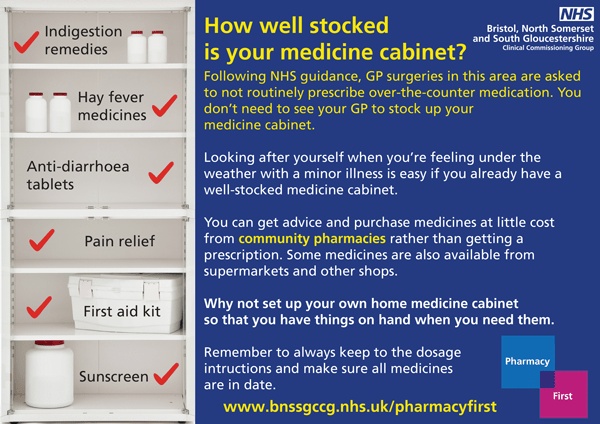Why should I self care?
You can manage most common conditions at home with support from community pharmacists, without the need to see your GP.
You will help ease the pressure on NHS services if you can manage the condition at home.
You can help free up some of your GP or nurse’s time, making it easier to get an appointment when you have a more serious or complex condition.
You will help to reduce the amount spent by your local NHS on medicines that are available over the counter and release resource to fund other health conditions and treatments.
How can I self care?
NHS Self Care Guides
A well stocked medicine cabinet

Following NHS guidance, GP surgeries in this area are asked to not routinely prescribe over-the-counter medication.
Looking after yourself when you’re feeling under the weather with a minor illness is easy if you already have a well-stocked medicine cabinet.
You can get advice and purchase medicines at little cost from community pharmacies rather than getting a prescription. Some medicines are also available from supermarkets and other shops.
Why not set up your own home medicine cabinet so that you have things on hand when you need them.
Remember to always keep to the dosage intructions and make sure all medicines are in date – for more information see www.bnssgccg.nhs.uk/pharmacyfirst
Online resources for self help guidance
There are plenty of resources available online that will help you with many minor illnesses. Click on the logos (below) to be taken to the main resources providing helpful guidance and useful information on how you can help yourself, or go to the Health Information section of this website for additional support and information. Our online resources page also lists many other useful web tools and apps.
Clevedon Minor Injury Unit
Clevedon Minor Injury Unit (MIU) offers treatment for adults and children over three years of age for a wide range of minor injuries.
You can drop in with no appointment necessary. All patients are seen by an Emergency Nurse Practitioner (ENP).
Find out more about the Clevedon MIU, the opening hours, the location and how to contact them.
First Aid
MP3 Downloads
Save them on your computer, right-click on any of the links below and then click ‘Save Target As…” . Click on any of the links below to play the audio files:
Burns – Explains the immediate treatment for burns and scalds.
Fits – How to deal with fits (convulsions/seizures) in adults and young children.
Wounds immmediate actions for wounds, bleeding, and bleeding associated with fractures.
Unconscious patient who is breathing – How to deal with an unrousable patient who IS breathing (includes recovery position)
CPR for adults – Adults who have collapsed, unrousable and NOT breathing.
CPR for babies who are unrousable and NOT breathing.
Collapsed patient in detail – Explains the complete scenario including checks for breathing, circulation, etc.
These files have been prepared by Sussex Ambulance Service and comply with European Resuscitation Council Guidelines.
British Red Cross – First Aid Tips Simple, straightforward and easy to understand first aid tips.
St Johns Ambulance St John Ambulance believes that everyone should learn at least the basic first aid techniques.




